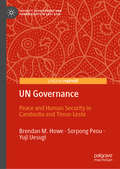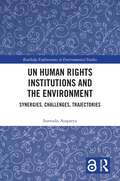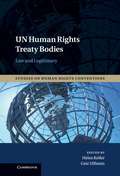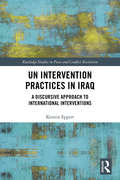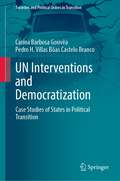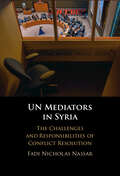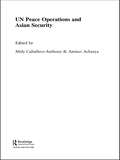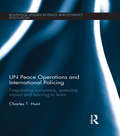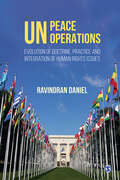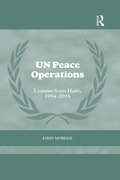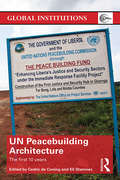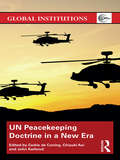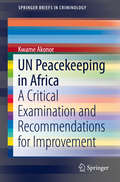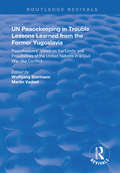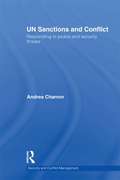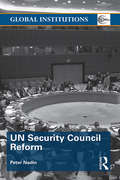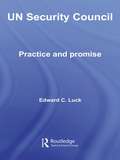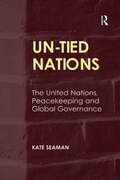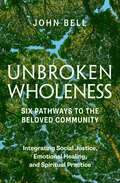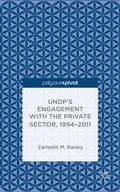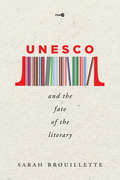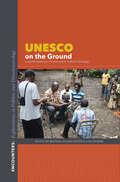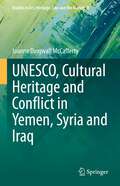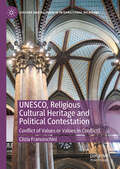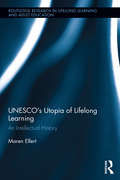- Table View
- List View
UN Governance: Peace and Human Security in Cambodia and Timor-Leste (Security, Development and Human Rights in East Asia)
by Brendan M. Howe Yuji Uesugi Sorpong PeouThis book evaluates UN performance in ensuring good governance in Cambodia and Timor-Leste from a human-centred standpoint. East Asian perspectives are juxtaposed with universal aspirations, and the legality, legitimacy, and effectiveness of UN operations in the two countries are considered. Each of the case-studies assesses the justifiability of intervening and of actions and policies implemented during the intervention, as well as considers the justifiability of the conditions left after UN withdrawal, while also including specific policy recommendations.
UN Human Rights Institutions and the Environment: Synergies, Challenges, Trajectories (Routledge Explorations in Environmental Studies)
by Sumudu AtapattuThis book presents an in-depth analysis of how UN Human Rights institutions and mechanisms have addressed environmental protection, sustainable development and climate change. Despite the increasing involvement of UN human rights bodies in addressing environmental degradation and climate change, a systematic review of the convergence between human rights and the environment in these bodies has not been carried out. Filing this lacuna, this book surveys the resolutions, general comments, concluding observations, decisions on individual communications and press releases. It identifies principles that have emerged, explores the ways in which human rights Charter-based and treaty-based institutions are interpreting environmental principles and examines how they contribute to the emerging field of human rights and environment. Given the disproportionate effect that polluting activities have on marginalized and vulnerable groups, Atapattu also discusses how these human rights mechanisms have addressed the impact on women, children, indigenous peoples, people with disabilities and racial minorities. Written by a world-renowned expert on human rights and the environment, this book will be of great interest to students and scholars researching and teaching in this important field of study.
UN Human Rights Treaty Bodies: Law and Legitimacy
by Helen Keller Geir UlfsteinThe effective implementation of human rights treaty obligations in national law is subject to increasing attention. The main responsibility for the international monitoring of national implementation at the global level is entrusted to the UN human rights treaty bodies. These bodies are established by the respective human rights conventions and are composed of independent experts. This book examines three aspects of these bodies: the legal aspects of their structure, functions and decisions; their effectiveness in ensuring respect for human rights obligations; and the legitimacy of these bodies and their decisions. Containing contributions from a variety of eminent legal experts, including present and former members of the treaty bodies, the analysis should be read in light of the ongoing effort to strengthen treaty bodies under the auspices of the UN High Commissioner for Human Rights and with the involvement of relevant stakeholders.
UN Intervention Practices in Iraq: A Discursive Approach to International Interventions (Routledge Studies in Peace and Conflict Resolution)
by Kerstin EppertThis book analyzes UN intervention discourses and practices in Iraq and develops a deconstructive approach to international interventions. Hitherto, most analyses of the conflict in Iraq in 2003 have established the UN’s role as path-dependent on the foreign policy of the US and the UK, and largely portrayed it as a mediator and fervent opponent of international intervention. Analyzing the UN Security Council and the later UN Assistance Mission for Iraq (UNAMI) from 2000 to 2010, this book undoes this path-dependency and puts the UN’s relationship with Iraq center-stage. It develops a deconstructive, critical approach that identifies subject construction and reflexivity as central processes of intervention practices and concludes that (non-)intervention is deeply connected to the stabilization of political identities and representations. Using extensive primary data, the book contributes a new perspective on international interventions. This book will be of much interest to students of peace and conflict studies, intervention and statebuilding, Middle Eastern studies and International Relations.
UN Interventions and Democratization: Case Studies of States in Political Transition (Societies and Political Orders in Transition)
by Carina Barbosa Gouvêa Pedro H. Castelo BrancoThis book analyzes United Nations (UN) interventions in the process of constitution making in states undergoing political change. It combines theoretical considerations of democracy and constitutionalism with empirical experiences and takes a critical perspective on the interventions developed by the United Nations in the processes of re-democratization. Presenting new empirical evidence on the substantive and procedural way in which the UN undertakes constitution building in Cambodia, Bosnia and Herzegovina, Afghanistan, and East Timor, the book illustrates difficulties of these practices such as the promotion of popular participation, as well as an increasing Westernization, and to meet local needs. In consequence, the authors call for reforms of the actions and structural methods the UN to better align a legitimate constitutional order with the rule of law and democratic values. This book is aimed at scholars and students of politics and law who are interested in the prerequisites and conditions for further democratization in states undergoing political transformation.
UN Mediators in Syria: The Challenges and Responsibilities of Conflict Resolution
by Fadi Nicholas NassarSince 2011, the conflict in Syria has been one of the most catastrophic conflicts of our time and a dark stain on the peacemaking abilities of the United Nations (UN). At the heart of this book is a simple but critical question – what do UN mediators tasked with the responsibility to make peace actually do? By explaining this, the book offers a detailed record of what Kofi Annan, Lakhdar Brahimi, and Staffan de Mistura did in their roles as UN mediators in Syria and presents a comprehensive analysis of the dynamics that shaped their decision-making. Beyond the cases of these three mediators, Fadi Nicholas Nassar introduces a method by which to forensically identify a mediator's fingerprints on the peacemaking process and charts a map to examine their decision-making processes. In doing so, it paves the way to evaluate the performance of these mediators – to hold them accountable for their successes and failures.
UN Peace Operations and Asian Security
by Mely Caballero-Anthony & Amitav AcharyaThis is an unparallelled analysis of the state of the United Nations peace operations and their impact on Asian security.This new volume examines new strategies being adopted by the UN; including doctrinal shifts in peace operation, and assesses the division of labour between the UN, regional organisation and non-governmental organisations/actors. Based on selected papers from mostly Asian scholars, the book offers regional perspectives from South, Southeast and Northeast Asia on the changing nature of UN Peace operations and analyses some of the core issues that are of critical relevance to regional security in Asia. In addition it reveals interesting new insights on the new players in the area of peace operations – i.e. China and Japan and considers their projected roles as defined by their respective security concepts. It also delves into issues of possible areas of concern caused by the new activism of these regional powers in peace operations. Finally, the book also revisits the significant lessons learnt from the UN experience in Cambodia and East Timor and examines their impact on future directions of peace operations.This book was previously published as a special issue of the leading journal International Peacekeeping.
UN Peace Operations and International Policing: Negotiating Complexity, Assessing Impact and Learning to Learn (Routledge Studies in Peace and Conflict Resolution)
by Charles T. HuntThis book addresses the important question of how the United Nations (UN) should monitor and evaluate the impact of police in its peace operations. UN peace operations are a vital component of international conflict management. Since the end of the Cold War one of the foremost developments has been the rise of UN policing (UNPOL). Instances of UNPOL action have increased dramatically in number and have evolved from passive observation to participation in frontline law enforcement activities. Attempts to ascertain the impact of UNPOL activities have proven inadequate. This book seeks to redress this lacuna by investigating the ways in which the effects of peace operations – and UNPOL in particular – are monitored and evaluated. Furthermore, it aims to develop a framework, tested through field research in Liberia, for Monitoring and Evaluation (M&E) that enables more effective impact assessment. By enhancing the relationship between field-level M&E and organisational learning this research aims to make an important contribution to the pursuit of more professional and effective UN peace operations. This book will be of much interest to students of peace operations, conflict management, policing, security studies and IR in general.
UN Peace Operations: Evolution of Doctrine, Practice and Integration of Human Rights Issues
by Ravindran DanielUN Peace Operations: Evolution of Doctrine, Practice and Integration of Human Rights Issues examines the UN Charter and other associated documents that laid the foundations for peace operations, discussing the evolution of peacekeeping doctrine in the pre- and post-Cold War years. It reviews the incorporation of new thematic areas in peace operations and studies the human rights components in them. The book examines UN’s response to global peace and security issues in the last 70 years and discusses the national, regional and global contexts in which the peace operations were deployed. Operations of importance are analysed by providing background to the conflicts and discussing the challenges faced. The book includes insights from the author’s first-hand experiences in Timor-Leste (East Timor), Libya and Sudan and offers policy recommendations. It would be of interest to scholars of politics, international relations, law, sociology, modern history and, especially, peace and conflict studies.
UN Peace Operations: Lessons from Haiti, 1994-2016 (Cass Series on Peacekeeping)
by Eirin MobekkThis book assesses the UN Peace Operations in Haiti and establishes what lessons should be taken into account for future operations elsewhere. Specifically, the book examines the UN’s approaches to security and stability, demobilisation, disarmament and reintegration (DDR), police, justice and prison reform, democratisation, and transitional justice and their interdependencies through the seven UN missions in Haiti. Drawing on extensive fieldwork and interviews conducted in Haiti, it identifies strengths and weaknesses of these approaches and focuses on the connections between these different sectors. It places these efforts in the broader Haitian political context, emphasises economic development as a central factor to sustainability, provides a civil society perspective, and discusses the many constraints the UN faced in implementing its mandates. The book also serves as a historical account of UN involvement in Haiti, which comes at a time when the drawdown of the mission has begun. In an environment where the UN is increasingly seeking to conduct security sector reform (SSR) within the context of integrated missions, this book will be a valuable contribution to the debate on intervention, UN peace operations and SSR. This book will be of interest to students of peace operations and peacekeeping, conflict studies, security studies and IR in general.
UN Peacebuilding Architecture: The First 10 Years (Global Institutions)
by Cedric De Coning Eli StamnesSince its establishment, the UN's Peacebuilding Architecture (PBA) has been involved in peacebuilding processes in more than 20 countries. This edited volume takes stock of the overall impact of the PBA during its first decade in existence, and generates innovative recommendations for how the architecture can be modified and utilized to create more synergy and fusion between the UN's peace and development work. The volume is based on commissioned research and independent evaluations as well as informed opinions of several key decision-makers closely engaged in shaping the UN's peacebuilding agenda. It seeks to find a balance between identifying the reality and constraints of the UN's multilateral framework, while being bold in exploring new and innovative ways in which the UN can enhance the results of its peace and development work through the PBA. The research and writing of each chapter has been guided by four objectives: to assess the overall impact of the PBA; to generate innovative ideas for how the PBA can be made more effective post-2015; to analyze the PBA’s role at the nexus of the UN's peace and development work; and to consider what would be required for the PBA to increase and improve its impact in future. It will be of interest to diplomats, UN officials, the policy community and scholars engaged in the debate following the 2015 review and the implementation of its recommendations, and will be an essential resource for UN and peacebuilding scholars.
UN Peacekeeping Doctrine in a New Era: Adapting to Stabilisation, Protection and New Threats (Global Institutions)
by Cedric De Coning Chiyuki Aoi John KarlsrudThis edited volume offers a thorough review of peacekeeping theory and reality in contemporary contexts, and aligns the two to help inform practice. Recent UN peacekeeping operations have challenged the traditional peacekeeping principles of consent, impartiality and the minimum use of force. The pace and scope of these changes have now reached a tipping point, as the new mandates are fundamentally challenging the continued validity of the UN peacekeeping’s core principles and identity. In response the volume analyses the growing gap between these actual practices and existing UN peacekeeping doctrine, exploring how it undermines the effectiveness of UN operations, and endangers lives, arguing that a common doctrine is a critical starting point for effective multi-national operations. In order to determine the degree to which this general principle applies to the current state of UN peacekeeping, this book: Provides a review of conceptual and doctrinal developments in UN peacekeeping operations through a historical perspective Examines the debate related to peace operations doctrine and concepts among key Member States Focuses on the actual practice of peacekeeping by conducting case studies of several UN peacekeeping missions in order to identify gaps between practice and doctrine Critically analyses gaps between emerging peacekeeping practice and existing doctrine Recommends that the UN moves beyond the peacekeeping principles and doctrine of the past Combining empirical case-based studies on UN peace operations, with studies on the views and policies of key UN Security Council members that generate these mandates, and views of key contributors of UN peacekeepers, this volume will be of great use to policy-makers; UN officials and peace operations practitioners; and academics working on peace and conflict/security studies, international organizations and conflict management.
UN Peacekeeping in Africa
by Kwame AkonorThis timely volume explores the "dark side" of United Nations (UN) Peacekeeping in Africa: when rather than help establish a rule of law in the host country, they become perpetrators of crime. The work of the UN peacekeepers is generally comprised of police and military personnel, from countries who contribute voluntarily to assist war-torn countries create conditions for lasting peace. Overall, these peacekeeping efforts are perceived positively, with volunteers giving their time and risking their lives to bring normalcy and peace to civilians in countries with conflict. In fact, there are cases where UN Peacekeepers are sometimes the victims of violent crimes, and need security and protection themselves. Although instances of abuse are not widespread and are certainly not isolated to Africa, this work focuses on Africa because there is a high concentration of UN Peacekeepers there, and lessons learned can be applied to other regions. The instances of abuse cover serious crimes including sexual abuse and exploitation, child and arms trafficking, and corruption, all of some of the most vulnerable populations in the world at the time. Although these instances are not extensive, they remain a fundamental problem because there is no existing mechanism for prosecution in the international area: it is only the troops' home country, not the UN, who has the right to exercise criminal jurisdiction. The also undermine the good work that UN Peacekeepers are doing all over the world. This work is concerned with highlighting why these instances occur, and why specific forms of abuse are more prevalent than others. It also discusses how to prevent abuse and violations from happening in the first place, and creating a culture of change and accountability. Finally, taking into account cultural and legal systems from troops' home countries, the author considers the ways that local rules can be aligned with international standards. In will be of interest to researchers in Criminology and Criminal Justice, International Relations, Sociology and Demography, Public Health, Comparative Law, and other related disciplines.
UN Peacekeeping in Trouble: Peacekeepers' Views on the Limits and Possibilities of the United Nation in a Civil War-Like Conflict (Routledge Revivals)
by Michael Rose Carl Bildt Yasushi Akashi Hans Hækkerup Bertrand De Lapresle Sadako Ogata John M. Sanderson Thorvald Stoltenberg Lars-Erik Wahlgren Wolfgang Biermann Martin VadsetFirst published in 1998, this volume is a record, both by detailed statistical analysis and by personal account, of lessons learned. These lessons are only useful if they are shared to ensure that they are not relearned the hard way. Any soldier or statesman who is involved in Peacekeeping Operations and anyone involved in the future of peacekeeping in the United Nations would be well advised to use this exceptionally insightful and informative work as one of their essential reference books. It contains a rich store of analysis and sober conclusions that makes it an indispensable guide and should serve as a source of inspiration and reflection, but even more it should serve to provide guidance for future action. Biermann and Vadset have made a major contribution to the analysis of UN field operations and an important source book for the study of UN and NATO operations.
UN Sanctions and Conflict: Responding to Peace and Security Threats (Routledge Studies in Security and Conflict Management)
by Andrea CharronThis book examines the application of the UN Security Council's mandatory sanctions since 1946, and, in particular, the regimes adopted for specific types of conflict. Beginning in the Cold War period with South Africa and Southern Rhodesia and continuing today, following the post-9/11 experience with Al Qaeda and the Taliban, sanctions are a key tool in the UN's efforts to deal with conflict. This book argues that the type of threat greatly influences the types of sanctions measures applied by the Security Council, who is targeted, as well as the objectives tied to the sanctions. The question of sanctions application is approached by classifying all 29 mandatory Security Council sanctions regimes into four conflict types: interstate; intrastate; international norm-breaking states; and support to terrorism. All of the sanctions regimes within each conflict type are analysed for: the objectives sought by the Council through the application of sanctions measures the targets chosen what measures are applied and in what sequence compared to other Security Council tools (such as peacekeeping missions or peace negotiations). The book sheds new light on how the Security Council approaches international peace and security beyond the application of force. Offering an excellent summary of the ins-and-outs of UN sanctions, and useful summary tables of UN sanctions regimes by conflict type, this book will be of great interest to students of international organisations, peace and conflict studies, conflict resolution, security studies and international relations or politics in general.
UN Security Council Reform (Global Institutions)
by Peter NadinThis volume comprehensively evaluates the current state and future reform prospects of the UN Security Council, providing the most accessible and rigorous treatment of the subject of reform to date. Apart from a couple of critical eyes in the academic community, few have asked the pertinent questions that this volume seeks to address: Will the enlargement of the Council constitute a reform? Could the inclusion of countries such as India, Germany, Japan, and Brazil markedly improve the Council’s agency? In response, this book focuses on: The Role and Agency of the UN Security Council The History of the Reform Debate An Expanded Council Working Method Reforms Enhancing Agency As the future of the UN Security Council continues to be the focus of fierce debate, this book will be essential reading for students of international relations, international organizations and international security studies alike.
UN Security Council: Practice and Promise (Global Institutions)
by Edward C. LuckWritten by best-selling author Edward C. Luck, this new text is broad and engaging enough for undergraduates, sophisticated enough for graduates and lively enough for a wider audience interested in the key institutions of international public policy. Looking at the antecedents of the UN Security Council, as well as the current issues and future challenges that it faces, this new book includes: historical perspectives the founding vision procedures and practices economic enforcement peace operations and military enforcement human security proliferation and WMD terrorism reform, adaptation and change.
UN-Tied Nations: The United Nations, Peacekeeping and Global Governance
by Kate SeamanWith the recent developments in Syria the United Nations is once again making headlines. The failure to reach an agreement on a Security Council resolution demonstrates the continued problems in forging a coherent international response to crisis situations. This lack of coherence continues despite recognition of the need for more cooperation to solve the growing list of global problems. With the relative success of global governance initiatives in relation to the environment, health issues, and economic problems, the focus has increasingly shifted to the problems of international security. This timely and important book represents a response to that shift and the implications this has for the wider international system. Using a number of relevant case studies (including the UN interventions in Bosnia, Somalia, Burundi, the Democratic Republic of Congo and East Timor) it examines the securitisation of global governance through the prism of United Nations Peacekeeping Operations and demonstrates that the development of both global governance and global security governance have transformed the environment in which international organisations, such as the United Nations, are operating. Moreover this book brings together a number of the key academic debates surrounding both global security governance and peacekeeping. It combines an examination of the power relations of global security governance, with the changing nature of peacekeeping operations. By bringing the two areas together the book for the first time bridges existing literatures and debates, from theoretical discussions of global governance, to practical examinations of peacekeeping operations. UN-Tied Nations provides a concise and analytical introduction to the ongoing debates around the development of global governance, global security governance, and the continuous impact these are having on the ability of the United Nations to act as an international peacekeeper.
UNBROKEN WHOLENESS: Integrating Social Justice, Emotional Healing, and Spiritual Practice
by John Bell&“A holistic vision breathtaking in scope.&”—Frances Moore LappéDistilling a lifetime&’s insights on the triangle of healing emotional pain, social justice work, and spiritual growth, veteran activist and educator John Bell shares personal stories and reflective practices to help us on our path of personal and collective transformationUnbroken Wholeness brings an integrated lens of social justice, trauma healing, and spiritual practice to the work we do in the world and the pressing concerns of our times.Collectively, these writings help us access a view of the world as unbroken, even in the face of obvious suffering and disharmony. With searching questions and easy-to-follow practices, Unbroken Wholeness offers a way for activists to apply mindfulness and insight to bring about healing for seemingly intractable social divisions. &“Skillfully handling our emotional pain about the world while cultivating a joyful and kind heart helps us navigate the troubled waters of our life,&” says John Bell. Continuing the peace work of his teacher, the Vietnamese social activist and Zen master Thich Nhat Hanh, John Bell brings forward the importance of cultivating a practical yet visionary, ennobling view of humankind when engaging in the &“mud&” of daily difficulties that gives rise to the lotus of an enlightened, compassionate heart.
UNDP’s Engagement with the Private Sector, 1994–2011
by Zarlasht M. RazeqAn engaging explanation and unique analysis of the increased involvement of the private sector in one of the world's most influential development organizations, the United Nations Development Program.
UNESCO and the Fate of the Literary (Post*45)
by Sarah BrouilletteA case study of one of the most important global institutions of cultural policy formation, UNESCO and the Fate of the Literary demonstrates the relationship between such policymaking and transformations in the economy. Focusing on UNESCO's use of books, Sarah Brouillette identifies three phases in the agency's history and explores the literary and cultural programming of each. In the immediate postwar period, healthy economies made possible the funding of an infrastructure in support of a liberal cosmopolitanism and the spread of capitalist democracy. In the decolonizing 1960s and '70s, illiteracy and lack of access to literature were lamented as a "book hunger" in the developing world, and reading was touted as a universal humanizing value to argue for a more balanced communications industry and copyright regime. Most recently, literature has become instrumental in city and nation branding that drive tourism and the heritage industry. Today, the agency largely treats high literature as a commercially self-sustaining product for wealthy aging publics, and fundamental policy reform to address the uneven relations that characterize global intellectual property creation is off the table. UNESCO's literary programming is in this way highly suggestive. A trajectory that might appear to be one of triumphant success—literary tourism and festival programming can be quite lucrative for some people—is also, under a different light, a story of decline.
UNESCO on the Ground: Local Perspectives on Intangible Cultural Heritage (Encounters: Explorations in Folklore and Ethnomusicology)
by Lisa Gilman Michael Dylan FosterFor nearly 70 years, the United Nations Educational, Scientific and Cultural Organization (UNESCO) has played a crucial role in developing policies and recommendations for dealing with intangible cultural heritage. What has been the effect of such sweeping global policies on those actually affected by them? How connected is UNESCO with what is happening every day, on the ground, in local communities? Drawing upon six communities ranging across three continents—from India, South Korea, Malawi, Japan, Macedonia and China—and focusing on festival, ritual, and dance, this volume illuminates the complexities and challenges faced by those who find themselves drawn, in different ways, into UNESCO's orbit. Some struggle to incorporate UNESCO recognition into their own local understanding of tradition; others cope with the fallout of a failed intangible cultural heritage nomination. By exploring locally, by looking outward from the inside, the essays show how a normative policy such as UNESCO's intangible cultural heritage policy can take on specific associations and inflections. A number of the key questions and themes emerge across the case studies and three accompanying commentaries: issues of terminology; power struggles between local, national and international stakeholders; the value of international recognition; and what forces shape selection processes. With examples from around the world, and a balance of local experiences with broader perspectives, this volume provides a unique comparative approach to timely questions of tradition and change in a rapidly globalizing world.
UNESCO, Cultural Heritage and Conflict in Yemen, Syria and Iraq (Studies in Art, Heritage, Law and the Market #8)
by Joanne Dingwall McCaffertyThis book aims to determine UNESCO's capability to facilitate heritage protection measures pre-conflict, emergency response measures during conflict and reconstruction efforts post-conflict. The book employs document analysis to ascertain UNESCO's legal obligations when it comes to facilitating cultural heritage protection in its Member States' territories in the condition of armed conflict, while drawing comparisons with the reality of the organisation's presence and involvement in Yemen, Syria and Iraq. This study maps shifts in UNESCO's level of communication with each country's respective government and civil authorities; allocation of financial, human and material resources; and implementation of heritage safeguarding and reconstruction initiatives. Both quantitative and qualitative data shows UNESCO to exhibit great inequity in engagement, at times, closing communications entirely with Syria, due to the political standpoints of other UNESCO Member States. This political gridlock is often shown to result in the organisation overstating its ability to safeguard or restore heritage, with promises not being followed up with action. Since 2015, UNESCO has expressed a stronger intent to be a key player in heritage protection during armed conflict, however as long as cultural heritage protection is not considered a humanitarian concern, UNESCO will not be able to circumvent much of the political and bureaucratic barriers facing intergovernmental organisations during conflict, which prevent emergency action from being implemented. In order to ensure heritage safeguarding is permitted during periods of significant unrest, regardless of political discord, it is crucial that UNESCO promote a people-centred approach to its cultural heritage protection initiatives. This book evidences that focusing on livelihoods and meaningful and practical connections between populations and their local heritage to be UNESCO's optimal methodological approach for justifying cultural heritage protection as a humanitarian necessity. The book's readership includes academics, researchers, and practitioners in the fields of political science, law and heritage studies.
UNESCO, Religious Cultural Heritage and Political Contestation: Conflict of Values or Values in Conflict? (Culture and Religion in International Relations)
by Clizia FranceschiniThis book offers an innovative study of UNESCO's religious heritage and nomination mechanisms. In particular, it shows how these processes can easily become instruments of power politics, undermining the neutrality and impartiality of the nomination processes. This is particularly true where political contestation for the exercise of sovereign authority over the site is politically contested and the competing claims are primarily based on shared cultural and religious narratives, which both sides in the dispute use to assert their claims. In this respect, religious heritage, both in its tangible and intangible dimensions, is the subject of national and global decisions that have political, cultural and religious implications. Starting from this premise, the book aims to show that the global regulatory framework and institutional decisions in the field of religious heritage are not neutral, but are determined by political discourses and agendas of governments and UNESCO.
UNESCO’s Utopia of Lifelong Learning: An Intellectual History (Routledge Research in Lifelong Learning and Adult Education)
by Maren ElfertWith a focus on lifelong learning, this book examines the shifts that UNESCO’s educational concepts have undergone in reaction to historical pressures and dilemmas since the founding of the organization in 1945. The tensions between UNESCO’s humanistic worldview and the pressures placed on the organization have forced UNESCO to depart from its utopian vision of lifelong learning, while still claiming continuity. Elfert interprets the history of lifelong learning in UNESCO as part of a much bigger story of a struggle of ideologies between a humanistic-emancipatory and an economistic-technocratic worldview. With a close study of UNESCO’s two education flagship reports, the Faure and Delors reports, Elfert sheds light on the global impact of UNESCO’s professed humanistic goals and its shifting influence on lifelong learning around the world.
